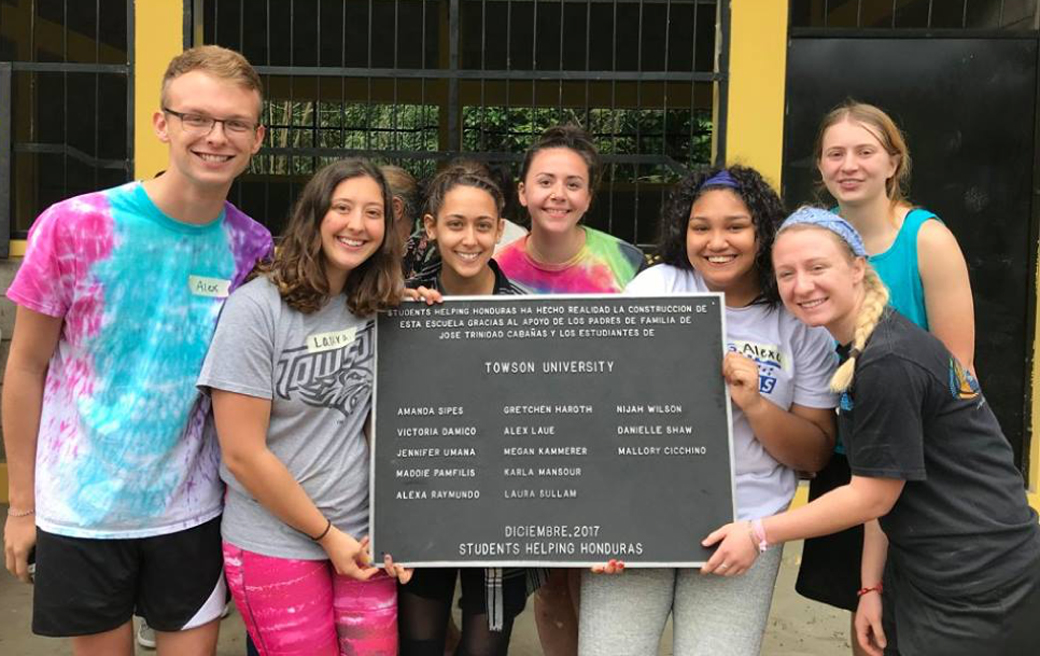TU students are rebuilding Honduras, one bucket at a time
The Towson University chapter of Students Helping Honduras continues to make a positive difference in the Central American country
By Kyle Hobstetter on March 16, 2018

For many college students, winter break serves as a time to relax, spend time with family and prepare for the spring semester. But for 35 Towson University students, winter break was used as a way to selflessly help the people of Honduras.
Earlier this year, members of the Towson University chapter of Students Helping Honduras (SHH) traveled to Arena Blanca in Honduras to help build schools for the children of the town.
Founded in 2010, the TU-chapter of SHH travels to a town in Honduras every year, and has built schools and Boys & Girls Homes there.
For many of the students, it’s their first time working in a construction setting. But one of the keys to SHH’s trips is that they get to work with the local community.
“It’s a lot of fun, but it’s a lot of hard work,” said Amanda Sipes ’19, co-president of TU SHH. “I know nothing about construction. So, one of the great things about Students Helping Honduras is that we work alongside Honduran community members and Honduran masons. They lead all the projects and they let us know what we need to do.
“We mix cement, we pass buckets of dirt and cement, we dig trenches, put in rebar, take out boulders — it’s a lot of work.”
TU Students Helping Honduras recognized for service
Started as a national organization in 2007, Students Helping Honduras provides volunteer opportunities to hundreds of students each year to raise funds and awareness to help impoverished towns in Honduras. Volunteers have aided in funding and building schools, homes, clean water and sanitation systems, soccer fields and more.
For Sipes, it was her fourth trip to the South American country, while her co-president Alexa Raymundo ’20 was on her third. And, while they take pride in providing these services and facilities, it was the relationships with the locals and their fellow volunteers that they remember and treasure most.
“There was this girl, who was about 10 years old, who came to the work site every day,” Sipes remembered. “She was digging with us, mixing cement with us and just bonding with all the volunteers. Then on the last day, as we were saying our goodbyes, she started crying — and everyone was crying because she was crying.
“She told us ‘I don’t really want you guys to leave. I can’t wait for you to come back.’” Sipes said. “It’s so easy to form super strong bonds with somebody, even though we’re there for just a short time.”
And while many may think these visits are just about students traveling to a South American beach community for fun, that is not the case. There are many dangers found in Honduras, dangers that include gangs, drug cartels and political unrest.
Each year, students who partner with SHH are given a security detail — usually through the Honduran military. But this year, the students were provided with private security because being seen with the military could be viewed by some locals as being involved with recent government corruption, said the co-presidents.
“Yes, it was scary, but I never felt in any danger,” Sipes said. “Yes, we are in Honduras, but we’re in a bubble in Honduras. We were always protected, and we never go anywhere alone.”
And when asked why they would not only return, but talk to other students about going, the co-presidents once again said it’s all about the relationships.
“When we are on campus telling others about the trip at interest meetings, there is only so much we can tell them,” Raymundo said. “But when others are actually, physically down there, I always hear them say ‘You were so right.’ And on the second day they are already saying ‘I can’t wait to be back next year,’…and I think that’s pretty amazing.”
Raymundo, whose mother was born in Honduras, also had a chance to visit the country in the summer. While the students just lay the foundation during the winter, construction continues in the summer and the fall, with buildings usually completed when the students return next winter.
It was the Towson University students hard work that was noticed by SHH founder Shin Fujiyama. When Fujiyama was presented with plaque from the town, he insisted that the TU students take it back to campus with them.
“I wasn’t expecting the plaque at all,” Sipes said. “They originally gave the plaque to (Fujiyama), and he gave it to us and said we were the ones who fundraised for this project, you’re the ones who deserve this.
“He said you take this back to Towson and show everyone and tell them how all of your hard work has paid off, and how we got to inaugurate this school. It was very surprising,” she added.
If students are interested in the TU chapter of SHH, the group holds meetings every Monday at 8 p.m. in room 5130 in the College of Liberal Arts Building. Students can also keep up to date with SHH by following their Instagram account.
As the spring semester continues, the TU SHH will continue to fundraise to send funds to workers in Honduras. They hold bake sales and plan to host a 5K race on May 12. And while it’s hard work, for Sipes, Raymundo and the other members of the SHH, all the work is worth it.
“Knowing you’re making an impact in something that’s bigger than yourself, that’s amazing,” Raymundo said.